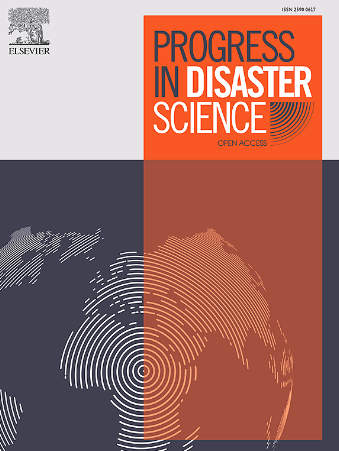Community resilience to wildfires: A systematic review of impacts, coping strategies, indicators, and governance challenges
IF 3.8
Q3 ENVIRONMENTAL SCIENCES
引用次数: 0
Abstract
Wildfires are socio-natural disasters of anthropogenic origin that threaten ecosystems and urban-rural interface communities. Strengthening community resilience (CR) is essential to reduce and mitigate associated risks and impacts. This study conducts a systematic review of global literature on CR to wildfires, following PRISMA 2020 guidelines. A total of 272 articles were retrieved from Web of Science, Scopus, EBSCO Host, and SciELO, with 30 meeting the inclusion criteria. Content analysis and narrative synthesis were conducted, segmenting findings into impacts, coping strategies, and promoters and barriers of CR, complemented by a meta-synthesis prioritizing qualitative post-disaster studies. Main impacts included environmental degradation and persistent mental health problems. Evacuations and social cohesion emerged as key coping strategies, while social support networks and emergency planning were critical promoters of resilience. Barriers included inadequate disaster risk governance, limited local capacities, and weakened community cohesion. Findings highlight the need to integrate technical and local knowledge to enhance disaster preparedness, response, and recovery, emphasizing the articulation between community initiatives and institutional frameworks. This study contributes evidence-based recommendations for strengthening community-based disaster risk management strategies, supporting holistic, multilevel approaches aligned with the Sendai Framework for Disaster Risk Reduction.
社区对野火的恢复力:对影响、应对策略、指标和治理挑战的系统回顾
野火是一种人为的社会自然灾害,对生态系统和城乡结合部构成威胁。加强社区复原力(CR)对于减少和减轻相关风险和影响至关重要。本研究根据PRISMA 2020指南,对全球关于野火CR的文献进行了系统回顾。在Web of Science、Scopus、EBSCO Host和SciELO中共检索到272篇文章,其中30篇符合纳入标准。进行了内容分析和叙事综合,将研究结果划分为影响、应对策略、促进因素和障碍,并辅以优先考虑灾后定性研究的元综合。主要影响包括环境退化和持续存在的精神健康问题。疏散和社会凝聚力成为关键的应对战略,而社会支持网络和应急规划是恢复力的关键促进因素。障碍包括灾害风险治理不足、地方能力有限以及社区凝聚力减弱。调查结果强调需要将技术和地方知识结合起来,以加强备灾、救灾和恢复,强调社区倡议和机构框架之间的联系。本研究为加强以社区为基础的灾害风险管理战略提供了基于证据的建议,支持与《仙台减少灾害风险框架》相一致的整体、多层次方法。
本文章由计算机程序翻译,如有差异,请以英文原文为准。
求助全文
约1分钟内获得全文
求助全文
来源期刊

Progress in Disaster Science
Social Sciences-Safety Research
CiteScore
14.60
自引率
3.20%
发文量
51
审稿时长
12 weeks
期刊介绍:
Progress in Disaster Science is a Gold Open Access journal focusing on integrating research and policy in disaster research, and publishes original research papers and invited viewpoint articles on disaster risk reduction; response; emergency management and recovery.
A key part of the Journal's Publication output will see key experts invited to assess and comment on the current trends in disaster research, as well as highlight key papers.
 求助内容:
求助内容: 应助结果提醒方式:
应助结果提醒方式:


